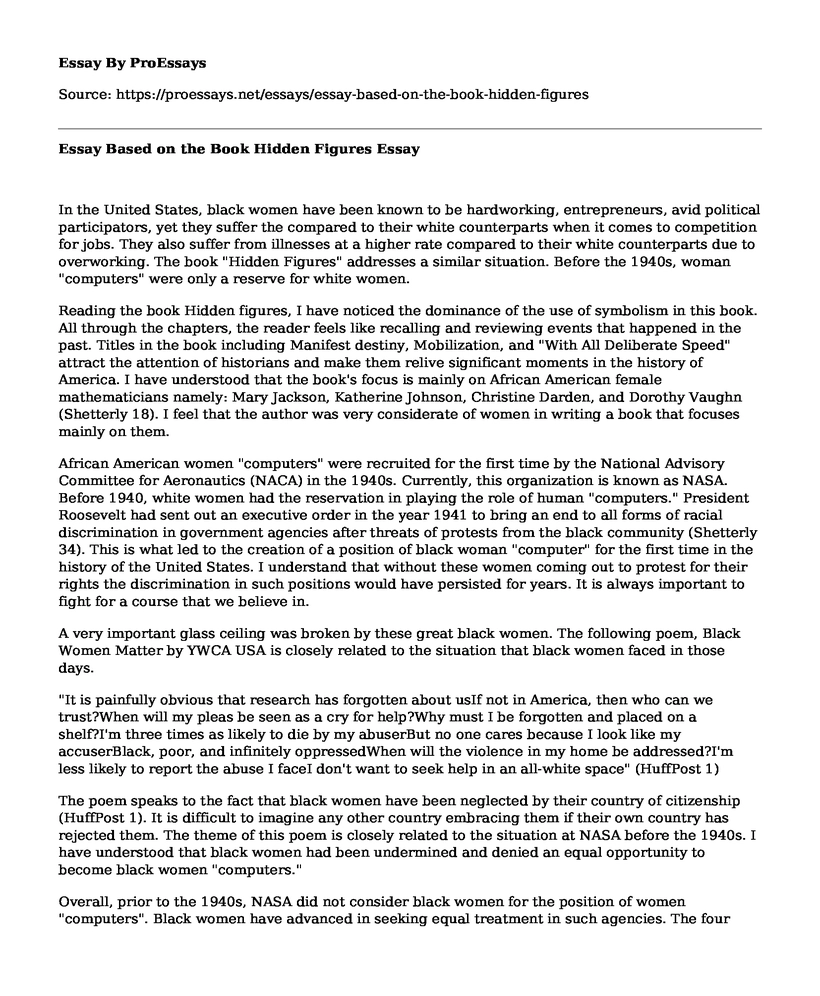In the United States, black women have been known to be hardworking, entrepreneurs, avid political participators, yet they suffer the compared to their white counterparts when it comes to competition for jobs. They also suffer from illnesses at a higher rate compared to their white counterparts due to overworking. The book "Hidden Figures" addresses a similar situation. Before the 1940s, woman "computers" were only a reserve for white women.
Reading the book Hidden figures, I have noticed the dominance of the use of symbolism in this book. All through the chapters, the reader feels like recalling and reviewing events that happened in the past. Titles in the book including Manifest destiny, Mobilization, and "With All Deliberate Speed" attract the attention of historians and make them relive significant moments in the history of America. I have understood that the book's focus is mainly on African American female mathematicians namely: Mary Jackson, Katherine Johnson, Christine Darden, and Dorothy Vaughn (Shetterly 18). I feel that the author was very considerate of women in writing a book that focuses mainly on them.
African American women "computers" were recruited for the first time by the National Advisory Committee for Aeronautics (NACA) in the 1940s. Currently, this organization is known as NASA. Before 1940, white women had the reservation in playing the role of human "computers." President Roosevelt had sent out an executive order in the year 1941 to bring an end to all forms of racial discrimination in government agencies after threats of protests from the black community (Shetterly 34). This is what led to the creation of a position of black woman "computer" for the first time in the history of the United States. I understand that without these women coming out to protest for their rights the discrimination in such positions would have persisted for years. It is always important to fight for a course that we believe in.
A very important glass ceiling was broken by these great black women. The following poem, Black Women Matter by YWCA USA is closely related to the situation that black women faced in those days.
"It is painfully obvious that research has forgotten about usIf not in America, then who can we trust?When will my pleas be seen as a cry for help?Why must I be forgotten and placed on a shelf?I'm three times as likely to die by my abuserBut no one cares because I look like my accuserBlack, poor, and infinitely oppressedWhen will the violence in my home be addressed?I'm less likely to report the abuse I faceI don't want to seek help in an all-white space" (HuffPost 1)
The poem speaks to the fact that black women have been neglected by their country of citizenship (HuffPost 1). It is difficult to imagine any other country embracing them if their own country has rejected them. The theme of this poem is closely related to the situation at NASA before the 1940s. I have understood that black women had been undermined and denied an equal opportunity to become black women "computers."
Overall, prior to the 1940s, NASA did not consider black women for the position of women "computers". Black women have advanced in seeking equal treatment in such agencies. The four women in "Hidden Figures" contributed massively in advocating for the rights of black women. However, the poem Black Women Matter clearly illustrates that they are yet to achieve that equality. Therefore, I feel that more should be done to address the plight of black women when it comes to seeking employment.
Works Cited
HuffPost. Black Women Matter, a Poem. [online] Available at: https://www.huffingtonpost.com/ywca-usa/black-women-matter-a-poem_b_8383062.html, 2018, Accessed 27 Mar. 2018.
Shetterly, Margot Lee. Hidden Figures. HarperCollins Nordic, 2017.
Cite this page
Essay Based on the Book Hidden Figures. (2022, Mar 26). Retrieved from https://proessays.net/essays/essay-based-on-the-book-hidden-figures
If you are the original author of this essay and no longer wish to have it published on the ProEssays website, please click below to request its removal:
- The Ballad of The White Horse by G.K. Chesterton Essay
- Essay on Satan Character in "Paradise Lost"
- Critical Essay on Elmer Gantry by Sinclair Lewis
- Literary Analysis Essay on Two for the Dough by Janet Evanovich
- The Language of the Third Reich Essay Example
- Essay on Myceneans: Pioneers of Ancient Greece and Language
- Identity in the House on Mango Street - Essay Sample







